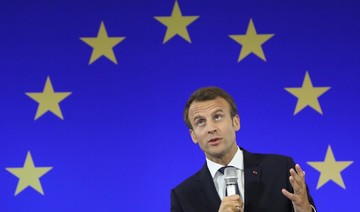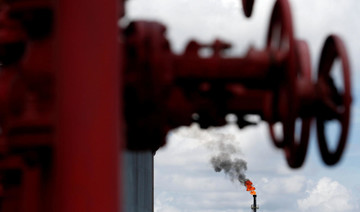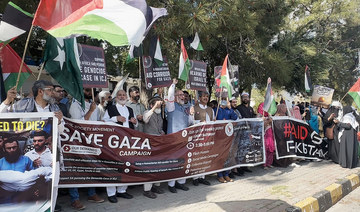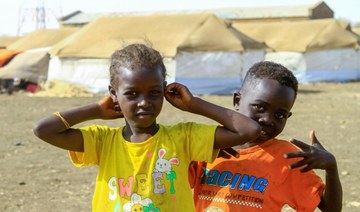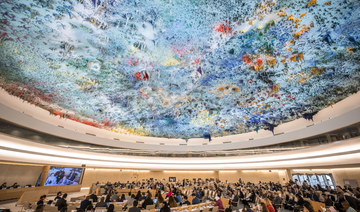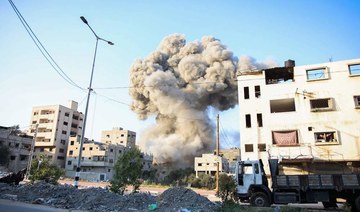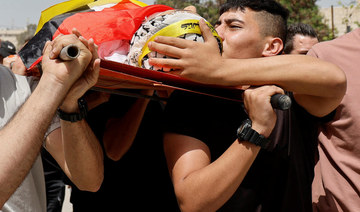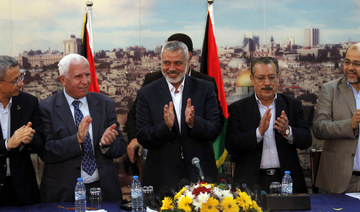LONDON: The United States escalated its financial pressure on Iran by slapping sanctions on the head of its central bank and barring anyone around the world from doing business with him, underscoring President Donald Trump’s hard line after his withdrawal from the Iranian nuclear accord upset European allies.
Valiollah Seif, the governor of the Iranian central bank, was named a “specially designated global terrorist” along with another senior official, Ali Tarzali, who works in the central bank’s international division. The Treasury Department accused the men of secretly funneling millions of dollars through an Iraqi bank to help Hezbollah, the militant network that the US considers a terrorist group.
The exact ramifications of the sanctions for Iran’s economy were not immediately clear. The US said that the sanctions on Seif — who is the equivalent of the Federal Reserve chairman in the US — did not extend to Iran’s central bank itself. Still, the US said it was imposing “secondary sanctions” on the Iranian bank officials, which could significantly increase Iran’s isolation from the global financial system.
Typically, when the US punishes individuals with sanctions, it prohibits Americans or US companies from doing business with them. Secondary sanctions also apply to non-Americans and non-US companies. That means that anyone, in any country, who does business with Seif or Tarzali could themselves be punished with sanctions, cutting them off from the US financial system.
The moves come as Trump’s administration, after deeming the 2015 nuclear deal insufficiently tough on Iran, seeks to construct a global coalition to place enough pressure on Tehran that it comes back to the negotiating table to strike a “better deal.” The sanctions targeting Iran’s central bank executives are some of the first actions by Trump’s administration since pulling out of the deal to start ramping up that economic pressure.
“The United States will not permit Iran’s increasingly brazen abuse of the international financial system,” Treasury Secretary Steven Mnuchin said. “The global community must remain vigilant against Iran’s deceptive efforts to provide financial support to its terrorist proxies.”
There was no immediate comment Tuesday night from Iranian officials. Iranian media initially reported the decision based on reports in the foreign media.
The US sanctions came as Iranian Foreign Minister Mohammad Javad Zarif was meeting in Brussels with the top French, British and German diplomats as the Europeans seek to keep Iran from bailing on the nuclear deal. The European members of the deal are trying to keep it alive without the US Yet it’s unclear that will be workable, because Trump has vowed to punish European companies that continue doing business with Iran despite re-imposed US sanctions.
Seif, a career banker, became the head of Iran’s Central Bank in 2013 under President Hassan Rouhani, who shepherded the nuclear deal. Seif frequently visits Washington to attend meetings of the International Monetary Fund.
He has helped guide Iran’s economy through the web of previous sanctions placed on that country. In the aftermath of the 2015 international nuclear accord, in which nuclear sanctions on Iran were lifted, Seid was a prominent voice complaining that Iran was still being kept out of the global financial system and not receiving the economic benefits it was promised in exchange for curtailing its nuclear program.
In a 2016 meeting of the Council on Foreign Relation in Washington, Seif said Iran achieved “almost nothing” from the deal.
The Treasury said that Seif undermined the central bank’s credibility by routing millions of dollars from the Quds Force, the expeditionary unit of Iran’s hard-line Revolutionary Guards, to Al-Bilad Islamic Bank, which is based in Iraq. Those funds were then used to “enrich and support the violent and radical agenda of Hezbollah,” Treasury said.
Al-Bilad Islamic Bank and its CEO and chairman, Aras Habib, were also hit with US sanctions, as was Muhammad Qasir, who the Treasury said is a Hezbollah official who has been a “critical conduit” for transferring funds to Hezbollah from the Revolutionary Guards.
Lebanon’s Hezbollah, the powerful Shiite guerrilla force that is also a prominent political player in Lebanon, has long helped carry out Iran’s foreign policy objectives in the Arabic-speaking world. Most recently, the US has been concerned about the role that Hezbollah fighters are playing in Syria to help prop up President Bashar Assad. Hezbollah fought a war with Israel in 2006, and Israeli officials have been deeply concerned about the prospect of another confrontation.
US imposes sanctions on head of Iran Central Bank
US imposes sanctions on head of Iran Central Bank
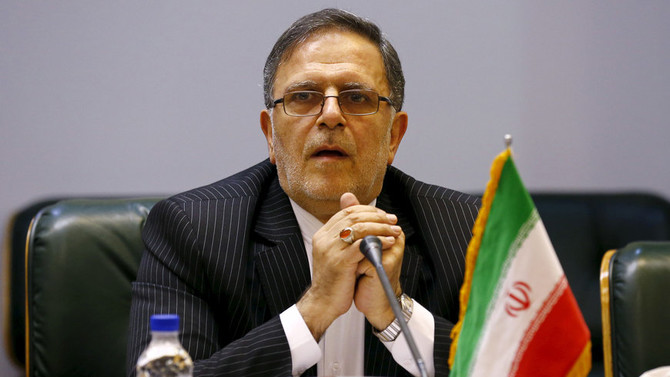
- The US said that the sanctions on Valiollah Seif — who is the equivalent of the Federal Reserve chairman in the US — did not extend to Iran’s central bank itself.
- Treasury Secretary Steven Mnuchin: “The United States will not permit Iran’s increasingly brazen abuse of the international financial system.”
Ships from Turkiye planning to deliver aid to Gaza were denied right to sail
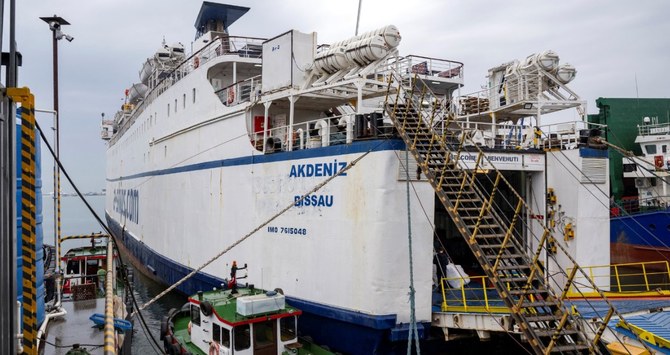
- The Freedom Flotilla Coalition described the cancelation of the vessels’ registry as a “blatantly political move,” adding: “Without a flag, we cannot sail”
- The organizers blamed Israel for applying pressure to prevent the flotilla
ISTANBUL: A three-ship flotilla planning to reach Gaza with humanitarian aid from Turkiye was prevented from sailing by Guinea-Bissau authorities, which took down their country’s flags from two ships, organizers said.
Just before the flotilla was set to sail from Turkiye to Gaza on Friday with 5,000 tons of aid, a surprise inspection by the Guinea-Bissau International Ships Registry resulted in the removal of the flags from two of the Freedom Flotilla ships.
A press release by the Freedom Flotilla Coalition described the cancelation of the vessels’ registry as a “blatantly political move,” adding: “Without a flag, we cannot sail.”
The organizers blamed Israel for applying pressure to prevent the flotilla. “It is obvious, and I think it is publicly known, that there has been close contact between Israel and the president of Guinea-Bissau,” organizer and steering committee member Torstein Dahle told The Associated Press, without elaborating.
He said that hundreds of Turkish and international participants were disappointed by the cancelation. “It is very hard for us, because it takes time to procure a flag. It’s a procedure that can’t be done in a few days. ... But we’re not giving up.”
The Freedom Flotilla Coalition includes Turkish and international organizations, among them the IHH and the Mavi Marmara Association from Turkiye, which also organized an ill-fated 2010 flotilla.
On May 31, 2010, Israeli commandos stormed the Mavi Marmara in international waters, leading to an altercation that left nine people dead and dozens of activists wounded. On the Israeli side, seven soldiers were wounded by activists who attacked them with clubs, knives and pipes.
Lebanon moves toward accepting ICC jurisdiction for war crimes on its soil
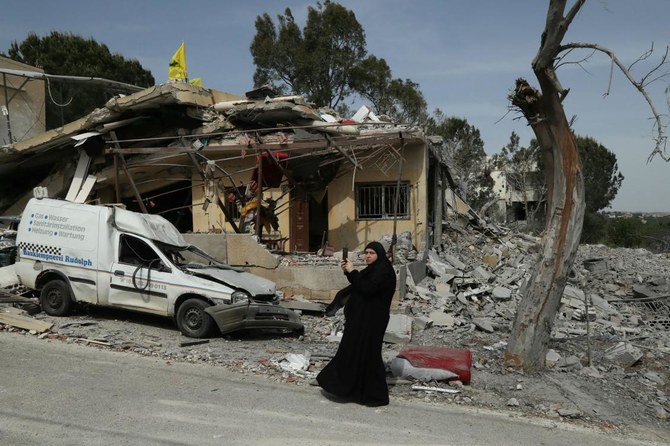
- Neither Lebanon nor Israel are members of the ICC
- Filing a declaration to the court would grant it jurisdiction to investigate and prosecute relevant crimes in a particular period
BEIRUT: Lebanon has moved toward accepting the International Criminal Court’s jurisdiction to prosecute violations on Lebanese territory since October, in what Human Rights Watch said on Saturday was a “landmark step” toward justice for war crimes.
Lebanon has accused Israel of repeatedly violating its sovereignty and committing breaches of international law over the last six months, during which the Israeli military and Lebanese armed group Hezbollah have traded fire across Lebanon’s southern border in parallel with the Gaza War.
That cross-border shelling has killed at least 70 civilians, including children, rescue workers and journalists, among them Reuters visuals reporter Issam Abdallah, who was killed by an Israeli tank on Oct. 13, a Reuters investigation found.
Lebanon’s caretaker cabinet voted on Friday to instruct the foreign affairs ministry to file a declaration with the ICC accepting the court’s jurisdiction to investigate and prosecute crimes committed on Lebanese territory since Oct. 7.
The decree also instructed the foreign ministry to include in its complaints about Israel to the United Nations a report prepared by the Netherlands Organization for Applied Scientific Research (TNO), an independent research institute.
That report looked specifically into Abdallah’s killing, and was produced by examining shrapnel, flak jackets, a camera, tripod and a large piece of metal that were gathered by Reuters from the scene, as well as video and audio material.
Neither Lebanon nor Israel are members of the ICC, which is based in The Hague. But filing a declaration to the court would grant it jurisdiction to investigate and prosecute relevant crimes in a particular period.
Ukraine has twice filed such declarations, which allowed for the court to investigate alleged Russian war crimes.
“The Lebanese government has taken a landmark step toward securing justice for war crimes in the country,” said Lama Fakih, Middle East and North Africa director at Human Rights Watch, urging the foreign minister to “swiftly” formalize the move by filing a declaration to the ICC.
“This is an important reminder to those who flout their obligations under the laws of war that they may find themselves in the dock,” Fakih said.
British troops may be tasked with delivering Gaza aid, BBC report says
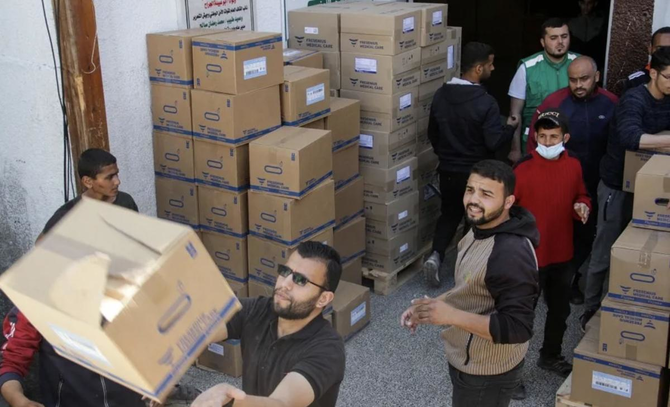
- Britain is already providing logistical support for construction of US pier, including a Royal Navy ship that will house hundreds of American soldiers
LONDON: British troops may be tasked with delivering aid to Gaza from an offshore pier now under construction by the US military, the BBC reported Saturday. UK government officials declined to comment on the report.
According to the BBC, the British government is considering deploying troops to drive the trucks that will carry aid from the pier along a floating causeway to the shore. No decision has been made and the proposal hasn’t yet reached Prime Minister Rishi Sunak, the BBC reported, citing unidentified government sources.
The report comes after a senior US military official said on Thursday that there would be no American “boots on the ground” and another nation would provide the personnel to drive the delivery trucks to the shore. The official, who spoke to reporters on condition of anonymity to discuss details not yet made public, declined to identify the third party.
Britain is already providing logistical support for construction of the pier, including a Royal Navy ship that will house hundreds of US soldiers and sailors working on the project.
In addition, British military planners have been embedded at US Central Command in Florida and in Cyprus, where aid will be screened before shipment to Gaza, for several weeks, the UK Ministry of Defense said on Friday.
The UK Hydrographic Office has also shared analysis of the Gaza shoreline with the US to aid in construction of the pier.
“It is critical we establish more routes for vital humanitarian aid to reach the people of Gaza, and the UK continues to take a leading role in the delivery of support in coordination with the US and our international allies and partners,” Defense Secretary Grant Shapps said in a statement.
Development of the port and pier in Gaza comes as Israel faces widespread international criticism over the slow trickle of aid into the Palestinian territory, where the United Nations says at least a quarter of the population sits on the brink of starvation.
The Israel-Hamas began with a Hamas-led attack into southern Israel on Oct. 7, in which militants killed around 1,200 people, mostly civilians, and took some 250 people as hostages. Israel says the militants are still holding around 100 hostages and the remains of more than 30 others. Since then, more than 34,000 Palestinians have been killed in Israel’s air and ground offensive, according to the Health Ministry in Hamas-run Gaza, around two-thirds of them children and women.
Israeli soldiers kill two Palestinian gunmen in West Bank, military says
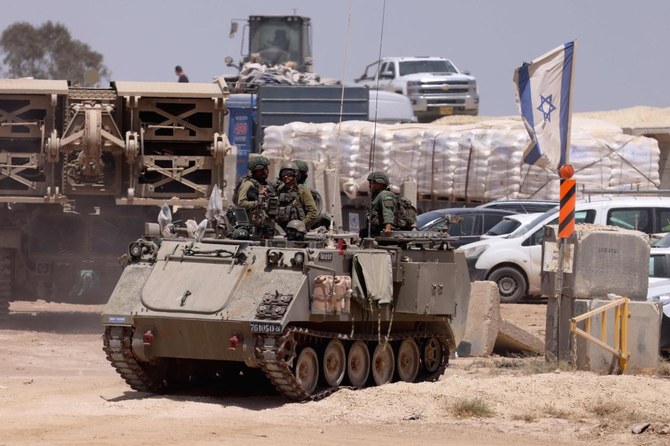
- Violence has been on the rise as Israel presses its attacks and bombardment in Gaza
RAMALLAH, West Bank: Israeli soldiers killed two Palestinian gunmen who opened fire at them from a vehicle in the occupied West Bank, the military said on Saturday.
The military released a photo of two automatic rifles that it said were used by several gunmen to shoot at the soldiers, at an outpost near the flashpoint Palestinian city of Jenin.
The official Palestinian news agency Wafa said security officials confirmed two deaths and the health ministry said two other men were wounded.
There was no other immediate comment from Palestinian officials in the West Bank, where violence has been on the rise as Israel presses its war against Palestinian militant group Hamas in Gaza.
Israel launched its offensive in Gaza after Hamas led an attack on southern Israel on Oct. 7 in which 1,200 people were killed and 253 taken hostage. More than 34,000 Palestinians have since been killed and most of the population displaced.
Violence in the West Bank, which had already been on the rise before the war, has since flared with stepped up Israeli raids and Palestinian street attacks.
The West Bank and Gaza, territories Israel captured in the 1967 war, are among the territories which the Palestinians seek for a state. US-brokered peace talks collapsed a decade ago.
Hamas says it received Israel’s response to its ceasefire proposal
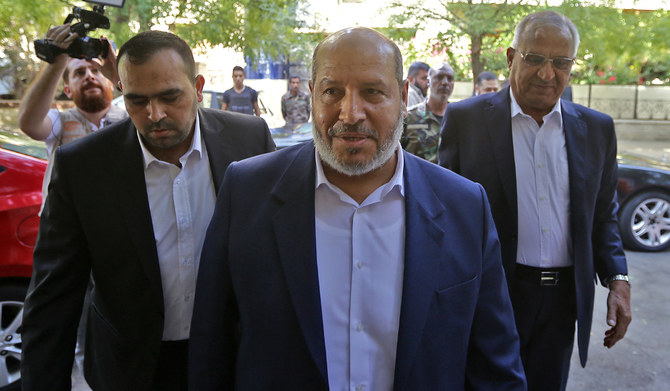
- White House national security adviser Jake Sullivan said on Friday he saw fresh momentum in talks to end the war and return the remaining hostages
- Israel has killed more than 34,000 Palestinians in Gaza, mostly women and children, according to the health ministry in the Hamas-run territory
CAIRO: Hamas said it had received on Saturday Israel’s official response to its latest ceasefire proposal and will study it before submitting its reply, the group’s deputy Gaza chief said in a statement.
“Hamas has received today the official response of the Zionist occupation to the proposal presented to the Egyptian and the Qatari mediators on April 13,” Khalil Al-Hayya, who is currently based in Qatar, said in a statement published by the group.
After more than six months of war with Israel in Gaza, the negotiations remain deadlocked, with Hamas sticking to its demands that any agreement must end the war.
An Egyptian delegation visited Israel for discussion with Israeli officials on Friday, looking for a way to restart talks to end the conflict and return remaining hostages taken when Hamas fighters stormed into Israeli towns on Oct. 7, an official briefed on the meetings said.
The official, who spoke on condition of anonymity, said Israel had no new proposals to make, although it was willing to consider a limited truce in which 33 hostages would be released by Hamas, instead of the 40 previously under discussion.
On Thursday, the United States and 17 other countries appealed to Hamas to release all of its hostages as a pathway to end the crisis.
Hamas has vowed not to relent to international pressure but in a statement it issued on Friday it said it was “open to any ideas or proposals that take into account the needs and rights of our people.”
However, it stuck to its key demands that Israel has rejected, and criticized the joint statement issued by the USand others for not calling for a permanent ceasefire and the withdrawal of Israeli forces from Gaza.
White House national security adviser Jake Sullivan said on Friday he saw fresh momentum in talks to end the war and return the remaining hostages.
Citing two Israeli officials, Axios reported that Israel told the Egyptian mediators on Friday that it was ready to give hostage negotiations “one last chance” to reach a deal with Hamas before moving forward with an invasion of Rafah, the last refuge for around a million Palestinians who fled Israeli forces further north in Gaza earlier in the war.
Meanwhile, in Rafah, Palestinian health officials said an Israeli air strike on a house killed at least five people and wounded others.
Hamas fighters stormed into Israeli towns on Oct. 7, killing 1,200 people and capturing 253 hostages. Israel has sworn to annihilate Hamas in an onslaught that has killed more than 34,000 Palestinians.


